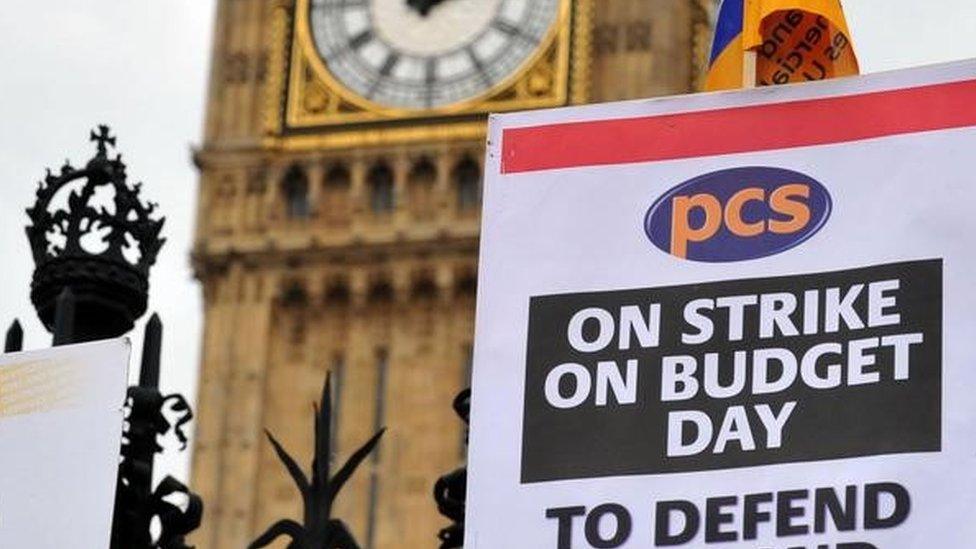How a bare-knuckle battle could play out
- Published
- comments

The government's latest defeat in the House of Lords could put the Business Secretary, Sajid Javid, under some pressure to save key elements of the Trade Union Bill.
Wednesday's vote was on an innocuous-looking motion to set up a special select committee to examine the sections of the bill dealing with political funding by unions and report by the end of February.
This not only tees up the possibility of some unwelcome (to the government) amendments, perhaps directly suggested by that committee, perhaps inspired by its report. It also means ministers will be negotiating against the clock, if they try to strike them down.
Take a look at the timetable for the bill. It is due to have four days of committee stage consideration, starting on 8 February - and it won't end until 24 February at the earliest, even assuming no go-slows or cunning filibustering tactics.
Given the way the Lords phases its debates, this, in turn, means that the crucial report stage, - probably requiring two full days - can't finish before 14 March. This is the point at which serious amendments will be put to the bill, and after that, the third reading is held a week later.
Going by the voting on Wednesday, when the government was defeated by 327-234 votes - a stonking 93-vote majority - ministers can expect to suffer a number of defeats on a variety of issues, where Labour and the Lib Dems can mobilise their peers to vote through amendments.
Party funding is just one of the potential flashpoints: there may also be amendments on key sections dealing with strike ballots and the collection of union membership subscriptions. That means there's some serious parliamentary ping-pong in prospect.
Ping-pong is the process where the Commons has to consider the changes the Lords have made to the bill and either accepts or rejects them; if the Lords amendments are rejected the bill has to be sent back to Peers, and if they then have to decide to bow to the will of the elected House, or suggest further amendments, usually watering down their original amendments a bit.
It can go on for quite some time.
And by then the clock will be ticking towards the end of the parliamentary session late in May, and the dreaded legislative "washup". This is process by which all outstanding legislation is agreed - and it is the moment when the Lords enjoys its maximum power because if it has not agreed to a bill when the music stops and the Parliamentary Session ends, that bill is lost.
Faced with that prospect ministers usually strike deals. But even factoring in the Easter holidays, they may not feel they are in immediate danger. There should be several weeks for any changes their Lordships make to the Trade Union Bill to bounce between Lords and Commons. And, if necessary, ping-pong can happen immediately and intensively, as soon as Peers have given the bill its third reading.
Cards to play
Of course, the government's parliamentary business managers have plenty of cards to play. They could for example keep both Houses sitting through the night, or even through several nights, to get their way.
In Wednesday's vote, the crucial Crossbench vote was more or less evenly divided (remember the Crossbenchers don't have a party line, still less a whip) with 38 voting with the government and 44 against. But key figures like Lord Bew, who chairs the Committee on Standards in Public Life, which has warned against changes to party funding rules that only affect one main party, not the other, and the former mandarin, Lord Kerslake, have emerged as important players who could swing the debate.
I'm told the special select committee's already lining up key witnesses - and its report could be crucial in those report stage votes on the party funding clauses of the bill. But look out, also, for a big push to allow electronic voting in union ballots. I suspect this may be one of the few areas where the government might offer a concession.
The bottom line is that for Labour the loss of millions of pounds of political funding as a result of the changes proposed in this bill could destroy its ability to compete with the Conservative Party; so whatever the rights and wrongs of opting into, rather than out of, a political levy, this will be a bare-knuckle battle for very high stakes.
Even with its current woes, the Labour Party can unite against what it perceives as a tribal attack, so the Labour peers may not go gently into that good night.